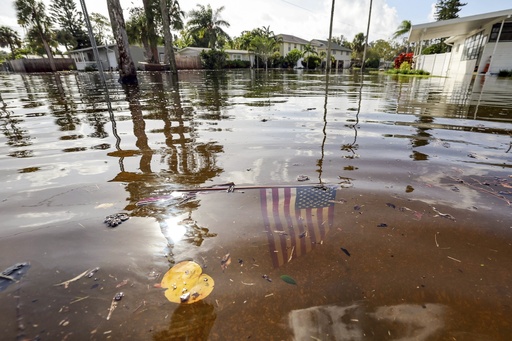Human-induced climate change has significantly impacted Hurricane Helene, increasing its rainfall by approximately 10% and its wind speed by around 11%, according to recent research from World Weather Attribution (WWA). The analysis comes at a time when Hurricane Milton is gaining strength and posing a threat to Florida’s coastline, less than two weeks after Helene’s catastrophic effects were felt.
The study indicates that Helene’s wind speeds were elevated by about 13 miles per hour (20.92 kilometers per hour), with the warmer ocean temperatures contributing to this phenomenon being 200 to 500 times more probable. Ocean readings in the Gulf of Mexico showed temperatures were roughly 3.6 degrees Fahrenheit (2 degrees Celsius) higher than usual, enhancing the storm’s ferocity. Ben Clarke, a climate scientist from Imperial College London and co-author of the study, remarked that the warm air could hold additional moisture, leading to rainfall totals that, even without climate change, would have been already astronomically high given the conditions.
As Hurricane Milton continues to rake the area, researchers warn that it may face similar enhancements due to the same climatic factors. The study emphasizes that ongoing fossil fuel consumption is likely to result in more hurricanes akin to Helene, leading to perilous flooding incidents deep inland rather than just along the coast. Notably, many casualties during Helene were a result of widespread inland flooding rather than intense winds.
Hurricane Helene made landfall in Florida, unleashing a record storm surge reaching 15 feet (4.57 meters) coupled with destructive sustained winds of 140 miles per hour (225.31 kilometers per hour). The storm caused significant damage across Georgia, the Carolinas, Tennessee, and Virginia, with numerous remote communities affected in the Appalachians, leaving millions without electricity, communication, and essential supplies. The storm was responsible for over 230 fatalities and became the deadliest hurricane to strike the continental U.S. since Hurricane Katrina in 2005.
Meteorologists estimate that Helene unleashed over 40 trillion gallons of rain, a surplus attributable to human-induced climate alterations, according to WWA. Clarke pointed out that even a marginal increase in rainfall volumes can drastically elevate the extent of destruction, reinforcing the need to address climate change decisively.
Previously, hurricanes of Helene’s magnitude were expected to occur roughly every 130 years, but they are now about 2.5 times more frequent in the affected region, according to the study. Founded in 2015, WWA assesses the connections between extreme weather events and climate change. Although their rapid assessments are not peer-reviewed, they rely on peer-reviewed methodologies to analyze the impact of climate change on severe weather, employing various models, including the Imperial College Storm Model and the Climate Shift Index.
Additionally, a recent study from Lawrence Berkeley National Laboratory revealed that climate change was responsible for around 50% more rainfall in certain areas of Georgia and the Carolinas, making the substantial precipitation observed in those regions up to 20 times more likely due to global warming. While Kim Cobb, the director of the Institute at Brown for Environment and Society, was not part of either study, she acknowledged the uncertainties involved but confirmed that global warming undeniably amplifies storms like Helene.
Cobb stated that Helene, alongside Milton, should act as a clarion call for enhancing emergency preparedness, resilience strategies, and reducing dependency on fossil fuels. She warned that additional warming expected over the next decade or two will exacerbate the severity of these storms, likely resulting in new record-setting events.
Research is already suggesting that climate change has contributed to the warmed ocean temperatures that enabled Milton to intensify rapidly. Clarke noted that the occurrence of two powerful hurricanes within a short time frame may forecast the future consequences of climate change if society fails to address it. He emphasized the necessity of altering energy systems and reducing fossil fuel reliance as key factors determining the level of risk and costs we will face in the future.
